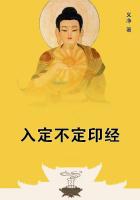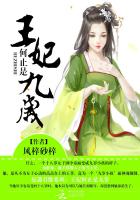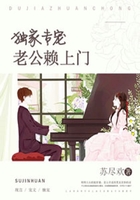Bang, bang! He had fired twice, purposely missing her. Miss Spencer never blenched. Racksole was tremendously surprised -and he would have been a thousandfold more surprised could he have contrasted her behaviour now with her abject terror on the previous evening when Nella had threatened her.
'You've got a bit of pluck,' he said, 'but it won't help you. Why won't you let us pass?'
As a matter of fact, pluck was just what she had not, really; she had merely subordinated one terror to another. She was desperately afraid of Racksole's revolver, but she was much more afraid of something else.
'Why won't you let us pass?'
'I daren't,' she said, with a plaintive tremor; 'Tom put me in charge.'
That was all. The men could see tears running down her poor wrinkled face.
Theodore Racksole began to take off his light overcoat.
'I see I must take my coat off to you,' he said, and he almost smiled. Then, with a quick movement, he threw the coat over Miss Spencer's head and flew at her, seizing both her arms, while Prince Aribert assisted.
Her struggles ceased - she was beaten.
'That's all right,' said Racksole: 'I could never have used that revolver - to mean business with it, of course.'
They carried her, unresisting, upstairs and on to the upper floor, where they locked her in a bedroom. She lay in the bed as if exhausted.
'Now for my poor Eugen,' said Prince Aribert.
'Don't you think we'd better search the house first?' Racksole suggested; 'it will be safer to know just how we stand. We can't afford any ambushes or things of that kind, you know.'
The Prince agreed, and they searched the house from top to bottom, but found no one. Then, having locked the front door and the french window of the sitting-room, they proceeded again to the cellar.
Here a new obstacle confronted them. The cellar door was, of course, locked; there was no sign of a key, and it appeared to be a heavy door. They were compelled to return to the bedroom where Miss Spencer was incarcerated, in order to demand the key of the cellar from her. She still lay without movement on the bed.
'Tom's got it,' she replied, faintly, to their question: 'Tom's got it, Iswear to you. He took it for safety.'
'Then how do you feed your prisoner?' Racksole asked sharply.
'Through the grating,' she answered.
Both men shuddered. They felt she was speaking the truth. For the third time they went to the cellar door. In vain Racksole thrust himself against it; he could do no more than shake it.
'Let's try both together,' said Prince Aribert. 'Now!' There was a crack.
'Again,' said Prince Aribert. There was another crack, and then the upper hinge gave way. The rest was easy. Over the wreck of the door they entered Prince Eugen's prison.
The captive still sat on his chair. The terrific noise and bustle of breaking down the door seemed not to have aroused him from his lethargy, but when Prince Aribert spoke to him in German he looked at his uncle.
'Will you not come with us, Eugen?' said Prince Aribert; 'you needn't stay here any longer, you know.'
'Leave me alone,' was the strange reply; 'leave me alone. What do you want?'
'We are here to get you out of this scrape,' said Aribert gently.
Racksole stood aside.
'Who is that fellow?' said Eugen sharply.
'That is my friend Mr Racksole, an Englishman - or rather, I should say, an American - to whom we owe a great deal. Come and have supper, Eugen.'
'I won't,' answered Eugen doggedly. 'I'm waiting here for her. You didn't think anyone had kept me here, did you, against my will? Itell you I'm waiting for her. She said she'd come.'
'Who is she?' Aribert asked, humouring him.
'She! Why, you know! I forgot, of course, you don't know. You mustn't ask.
Don't pry, Uncle Aribert. She was wearing a red hat.'
'I'll take you to her, my dear Eugen.' Prince Aribert put his hands on the other's shoulder, but Eugen shook him off violently, stood up, and then sat down again.
Aribert looked at Racksole, and they both looked at Prince Eugen.
The latter's face was flushed, and Racksole observed that the left pupil was more dilated than the right. The man started, muttered odd, fragmentary scraps of sentences, now grumbling, now whining.
'His mind is unhinged,' Racksole whispered in English.
'Hush!' said Prince Aribert. 'He understands English.' But Prince Eugen took no notice of the brief colloquy.
'We had better get him upstairs, somehow,' said Racksole.
'Yes,' Aribert assented. 'Eugen, the lady with the red hat, the lady you are waiting for, is upstairs. She has sent us down to ask you to come up. Won't you come?'
'Himmel!' the poor fellow exclaimed, with a kind of weak anger.
'Why did you not say this before?'
He rose, staggered towards Aribert, and fell headlong on the floor.
He had swooned. The two men raised him, carried him up the stone steps, and laid him with infinite care on a sofa. He lay, breathing queerly through the nostrils, his eyes closed, his fingers contracted; every now and then a convulsion ran through his frame.
'One of us must fetch a doctor,' said Prince Aribert.
'I will,' said Racksole. At that moment there was a quick, curt rap on the french window, and both Racksole and the Prince glanced round startled. A girl's face was pressed against the large window-pane. It was Nella's.
Racksole unfastened the catch, and she entered.
'I have found you,' she said lightly; 'you might have told me. Icouldn't sleep. I inquired from the hotel-folks if you had retired, and they said no; so I slipped out. I guessed where you were.'
Racksole interrupted her with a question as to what she meant by this escapade, but she stopped him with a careless gesture. What's this?' She pointed to the form on the sofa.
'That is my nephew, Prince Eugen,' said Aribert.
'Hurt?' she inquired coldly. 'I hope not.'
'He is ill,' said Racksole, 'his brain is turned.'
Nella began to examine the unconscious Prince with the expert movements of a girl who had passed through the best hospital course to be obtained in New York.
'He has got brain fever,' she said. 'That is all, but it will be enough.
Do you know if there is a bed anywhere in this remarkable house?'















